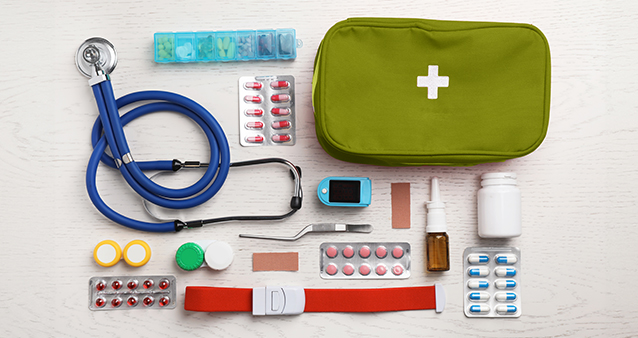Taking the Tax out of Medical Expenses

When it comes to South African taxes, Medical Aid tax credits are a sweet relief. But do you know if you’re eligible for them?
And if you are, how are they calculated? We break it down in the guide below.
What are Medical Tax Credits?
A tax credit is an amount that you can deduct from your tax payable. A medical tax credit is the total of various amounts that you’ve paid for medical expenses and can be deducted from your overall tax liability. This includes Medical Aid premiums and other qualifying expenses.
According to SARS, “serious injury or illness” can result in very high bills in comparison to your income, which can be difficult to meet. By extension, it may make it harder for you to settle your tax obligations to SARS, which becomes a problem for the fiscus. To help prevent this, SARS gives you relief in the form of a medical tax credit.
How Do You Claim Medical Tax Credits?
1. Gather Your Documents
First off, collect all the documents you need:
- Your medical scheme tax certificate (this will be emailed to you by your Medical Aid by July every year. You can also email them for it or download it from their self-service portal.)
- Proof of excess Medical Aid expenses (i.e. receipts for doctors' visits and prescription meds that you paid for)
- Any additional paperwork for dependents and disabilities.
2. Determine Your Tax Credits
Make sure you understand the tax credits you’re claiming for:
- Medical Scheme Fees Tax Credit (MTC): This is a fixed monthly amount you can claim for yourself, your spouse, and your dependents.
- Additional Medical Expenses Tax Credit (AMTC): This applies if you have out-of-pocket medical expenses that exceed a certain threshold (more on this below).
3. How Your Tax Credits Are Calculated
When it comes to your Medical Aid tax credits, SARS would have received your data from your Medical Aid and pre-populated the return with what is on your Medical Aid tax certificate.
In addition, SARS automatically calculates the medical tax credit and if you have additional expenses calculates the additional medical expenses tax credit.
For MTC, SARS gives you R364 credit per month for yourself and the first dependent, and R246 per month for each additional dependent.
For AMTC, SARS credits 25% of your expenses exceeding 7.5% of your taxable income if you're under 65 without a disability. If you're over 65 or have a disability, they credit 33.3% of all out-of-pocket expenses.
4. Complete Your Tax Return
- Visit the SARS eFiling website and log in.
- Start a new tax return (ITR12).
- Enter your Medical Aid Information.
- Go to the “Medical Deductions” section.
- Enter your Medical Aid contributions and the number of dependents.
- Fill in the total amount of your out-of-pocket medical expenses.
5. Review and Submit
Double-check all the amounts and information entered. Once you’re sure everything is correct, submit your tax return.
What are the Qualifying Medical Expenses for Tax?

Understanding what constitutes a qualifying medical expense can unlock potential tax savings.
As we mentioned, your Medical Aid contributions and out-of-pocket medical expenses qualify. Below, we look at what those qualifying out-of-pocket medical expenses include:
Prescription Medication
Medicines prescribed by your doctor and purchased from a pharmacy can reduce your tax bill. Remember to keep those pharmacy receipts handy, as you can’t claim without this proof.
It’s important to remember that over-the-counter medication—think mild painkillers and throat lozenges you can buy without a prescription—don’t qualify as medical expenses for tax credit purposes.
Dental and Other Specialist Healthcare Costs
Expenses related to consulting with a dentist and a variety of other specialist medical practitioners are tax deductible. Any medication that these healthcare professionals supply or prescribe can also reduce your tax bill.
- Dentists
- Optometrists
- Homeopaths
- Naturopaths
- Osteopaths
- Herbalists
- Physiotherapists
- Chiropractors
- Orthopaedists
Nursing Home or Hospital Expenses
SARS lets you claim some bills that your Medical Aid didn’t pay for.
This includes any money that you’ve paid to a nursing home or hospital as well as registered and enrolled nurses, midwives or nursing assistants.
Medical Expenses Incurred Outside of South Africa
Sometimes, seeking the right medical care might involve a journey.
If you’re unable to receive care in South Africa—maybe because we don’t have specialists or equipment necessary to treat your condition or simply because you’re not in the country when you get sick—you can set these off against your tax with SARS.
Who Can Claim Medical Aid Tax Credits?

Anyone who contributes to a medical scheme can claim tax credits. You can also claim for expenses you’ve incurred on behalf of your dependents.
SARS considers anyone who you support financially to be a dependant. This includes spouses, kids under 21, and those over 21 who you still support. Even parents or siblings qualify if they rely on you financially.
Get Tax Back with Medical Aid Tax Credits
There you have it: a roadmap to elevate your financial well-being while nurturing your health.
Since you’re focused on savings, don’t forget the biggest money-saving tip of all – comparing Medical Aid quotes so you know you’ve got the best deal.
Hippo lets you compare up to 10 Medical Aid quotes and pick one that suits your pocket. It takes a few minutes and is completely free. Why not try it today?
Hippo Blog Categories

































